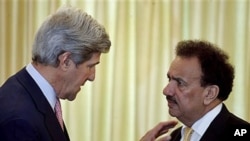Officials in Pakistan and the United States are reassessing their partnership in the fallout from the covert U.S. raid into Pakistan that killed al-Qaida leader Osama bin Laden. This re-evaluation includes whether the U.S. should continue giving Pakistan billions of dollars in annual assistance.
The fact that the United States found and killed Osama bin Laden on Pakistani territory has thrown the relationship between the two countries into uncertainty, especially in terms of whether or not Washington should continue aid to its partner in the war on terrorism.
From the American side, questions are being raised concerning what the U.S. gets in return for the nearly $4 billion in annual assistance for the Pakistani military and development programs.
Speaking at a U.S. Senate Foreign Relations Committee meeting this week, Senator Bob Corker said many U.S. lawmakers are reconsidering this help.
"I think most of us are wanting to call time-out on aid until we can ascertain what is in our best interest in what I would consider more of a transactional relationship," he said.
There is also criticism on the Pakistan side about U.S. aid. Some point to the fact that much of the assistance is in fact loans that Pakistan is obligated to pay back.
Shabaz Shariff is the chief minister of Punjab province, Pakistan's richest and most populous region. He said the obligations that America demands of Pakistan in return for the aid are no longer acceptable if Pakistan wants to remain independent of outside influence.
He said it is possible that you accept foreign aid, but when they forward you a list of their demands, you arrogantly refuse to accept them. "I believe that we cannot claim sovereignty for our country as long as we rely on foreign aid," said Shariff.
On Friday, Punjab canceled six aid agreements with the United States.
Punjab's leadership is held by the main opposition party in Pakistan, the PML-N. There is criticism from some in Pakistan that the party is trying to score political points in the current environment by making symbolic cuts to U.S. aid.
Analysts say any rejection or withdrawal of U.S. aid may cause real damage in the long-term. Pakistan's reputation could suffer along with its pocketbook as other investors re-assess their investments in the country. The International Monetary Fund, in particular, has an $11 billion loan to Pakistan that analysts say is essential to the economy.
For USAID director in the country, Andrew Sisson, it is a time to keep a close eye on politics, both in Pakistan and in the United States, because long-term programs are key.
"I am following very closely politics here and politics in the United States," he said. "Yes, I am hoping our program won't be cut. Because we are all about partnership. And long-term development is based on trust and long-term investments, and reduction in that or a cut in that would undermine that longer term partnership we are trying to develop. I hope it doesn't happen."
There are many experts on Pakistan who say that if the U.S. did turn its back on Pakistan, it could backfire.
As Pakistani economist Qais Aslam puts it, the last time the U.S. slapped sanctions on Pakistan following the 1998 testing of nuclear weapons, it helped drive Pakistan into the hands of Islamist extremists.
"America did this mistake once before when we had a nuclear blast. And they cut down on our aid and our relationship with, economic. And look what happened? We became a home to terrorism. And if they are going to do this again, they might send us back to that," said Aslam.
It was only after the September 11, 2001, attacks that the U.S. began to fully re-invest in Pakistan. Since 2002, America has provided $20 billion. Much of that aid has been in military assistance so that Pakistan could pursue extremists in the volatile border region near Afghanistan.
But there also is so-called soft power - trying to provide infrastructure development, education and stability in areas recently won over from extremists. And that, said USAID director Sisson, could be a significant factor in eliminating the international threat from terrorists based in the region.
"Helping Pakistan grow economically, create more jobs, a healthier population - we believe contributes to a more stable Pakistan," he said. "We are making a lot of investments directly in areas where there is, or has been recently, conflict generated by extremists."
According to many in the American leadership, including Senator John Kerry in his recent visit to Pakistan, the need for stability in Pakistan outweighs the importance of singling out or punishing the country for any perceived assistance in sheltering bin Laden.
US, Pakistan Question Aid




